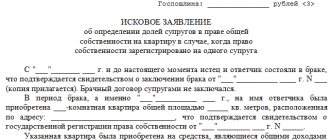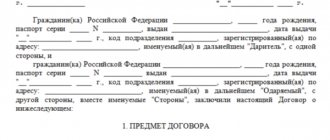As a rule, acquiring rights to real estate is a conscious decision and allows you to improve your living conditions or invest money in a reliable property. However, under various circumstances, it is possible to waive the registered right to an apartment at the will of the owner.
In the material presented, you can find out who has the right to renounce ownership of real estate, and how the renunciation of ownership of an apartment is formalized.
Important! If you are dealing with your own case related to the relinquishment of ownership of an apartment, then you should remember that:
|
Relinquishment Laws
The grounds for the emergence, transfer or termination of property rights are regulated by the Civil Code of the Russian Federation. Special conditions for renunciation of ownership rights, including real estate, are specified in Art. 236 of the Civil Code of the Russian Federation.
This procedure is characterized by the following features:
- the subject of the waiver of the right to real estate can be a citizen or organization whose property is registered with the Rosreestr service;
- refusal must be expressed in an announcement about this or the commission of other actions that clearly indicate exclusion from ownership, use and disposal of real estate;
- When making a refusal, it is not allowed to include any conditions expressing the intention to retain any rights to real estate.
Important!
Art. 236 of the Civil Code of the Russian Federation provides that even taking actions to renounce property will not entail legal consequences until another person acquires rights to the property.
In addition, in Art. 235 of the Civil Code of the Russian Federation establishes other options for termination of ownership rights, which can be used along with direct refusal:
- alienation of real estate to third parties under paid or gratuitous transactions;
- destruction of real estate;
- loss of property rights due to legal requirements.
For certain types of real estate, the conditions for renunciation of ownership rights may be established by special rules. In particular, when abandoning a privatized apartment, it is necessary to be guided by the relevant Law of July 4, 1991 No. 1541-1 “On the privatization of housing stock in the Russian Federation” (a separate article 9.1 was introduced for this purpose), and for abandoning inherited property - by part of the third Civil Code of the Russian Federation.
Lawyer Ilya Titov (St. Petersburg) answers:
According to Art. 256 of the Civil Code of the Russian Federation, property acquired by spouses during marriage, as a general rule, is their joint property.
According to the Civil Code of the Russian Federation and the Investigative Committee of the Russian Federation, joint property of spouses is a special regime that presupposes the presence of a common property mass owned by both spouses equally, but excluding the presence of allocated shares. For example, spouses in a marriage bought an apartment, use it, but the wife or husband cannot sell or give ½ of this apartment to someone (assuming it is their half), because one of the spouses does not own some part of this apartment: the whole The apartment belongs to both the husband and wife at the same time.
That is why, in order to somehow dispose of the share in the common property of the spouses, it is first necessary to transfer the property from joint ownership to shared ownership.
Out of court, spouses can determine shares using one of the documents:
- marriage contract
- or an agreement on the division of common property acquired by spouses during marriage (hereinafter referred to as an agreement on the division of common property).
When choosing a document, spouses should also keep in mind that a marriage contract can be declared invalid in court (Article 44 of the RF IC) at the request of one of the spouses, if it is established that the terms of such a contract place this spouse in an extremely unfavorable position.
Thus, it is very risky to determine the shares of the spouses in a marriage contract that differ significantly from ½.
After the spouses have signed a marriage contract or an agreement on the division of common property, and a notary has certified it, the husband and wife need to register a change in the form of ownership of real estate in Rosreestr (Federal Service for State Registration, Cadastre and Cartography). To do this, you need to pay a state fee of 2 thousand rubles, write an application, attach marriage contracts to it and apply with these documents to the MFC.
After registering the changes in the Unified State Register of Real Estate (USRN), the right to real estate will be reflected in shares, the size of which was determined by the spouses.
If the spouses have agreed that one of them renounces his share in the common property in favor of the other, then such a refusal is also formalized by a notary in a separate document (after the changed regime of ownership of real estate has been registered in Rosreestr). Spouses may provide that one of them renounces his share in favor of the other without compensation or on the basis of compensation (for example, the wife renounces ½ share in an apartment, and the husband pays her the cost of this share).
Spouses should also take into account that when dividing jointly acquired property after divorce using an agreement on the division of common property, situations are possible when one spouse will own more than ½ of the total property (the presence or absence of compensation for the difference in the amount of shares of the spouses does not matter). In this case, the difference in value exceeding his ½ share is his profit (enrichment).
On the profit, the spouse will be required to pay personal income tax according to the Tax Code of the Russian Federation (based on Letter of the Federal Tax Service of Russia dated March 15, 2017 No. BS-4-11/4624). For example, if the spouses agreed that the ex-husband will own ¾ of the apartment, and the ex-wife – ¼ (with or without compensation), then the husband will be required to pay personal income tax on ¼.
Thus, in order for one spouse to renounce his share in the property that was acquired during the marriage, he needs to go through three stages, spend a lot of money on legally significant actions of a notary and government agencies, and also be patient and time-consuming, since the process can take a long time.
How to give up property?
Based on these grounds, the waiver of ownership of real estate can only be expressed by drawing up a written document with its obligatory registration in the Rosreestr service. This is due to the main principle of real estate turnover - the vast majority of legally significant actions must be registered with the Rosreestr authorities.
Article 236 of the Civil Code of the Russian Federation directly states that the refusal of one party from the right of ownership can only take place if a similar right arises simultaneously in another entity. This means that the waiver of ownership of real estate must be expressed in simultaneous actions of two parties.
Registration of a gift agreement
This form of waiver is best suited if the purpose is to transfer property to a close relative.
It is important to understand that a gift is a gratuitous transaction that should not have additional conditions for the transfer of ownership rights. In addition, if a deed of gift is concluded by close relatives, they are exempt from paying income tax on this transaction. Otherwise, the tax is:
- 13% of the inventory value of property (for citizens of the Russian Federation).
- 30% – for foreigners.
Article 574 of the Civil Code of the Russian Federation determines that a gift agreement can be drawn up in free form and without having it certified by a notary.
But, as with any transaction, in order to renounce ownership of real estate through a gift, you need to collect a list of documents:
- Registration certificate of the apartment from the BTI.
- Documents establishing the right of ownership of this apartment.
- Passports of the parties to the transaction.
- Documents about the relationship between them (if the deed of gift is drawn up by relatives).
- Certificate from the Unified State Register of Real Estate.
Sometimes additional documents may be required. For example, when transferring a share of property acquired jointly during marriage, the consent of the spouse will be required.
After re-registration with Rosreestr, the process of transfer of ownership will be completely completed.
Who can refuse property?
A waiver of ownership rights can only be declared by an entity that has the authority to dispose of real estate, i.e. owner. Since the existence of ownership rights to residential premises is confirmed by an entry in the Unified State Register of Real Estate, only the persons indicated in the register will be able to take actions aimed at abandoning the property.
Important!
Public entities, as well as state and municipal bodies, do not have the right to renounce ownership of real estate under any circumstances.
Disposal of real estate, including waiver of rights, is permitted through a representative. To do this, it is necessary to issue a notarized power of attorney, which will indicate not only the authority to renounce ownership rights, but also a list of actions that the representative has the right to carry out.
Yulia Dymova, director of the Est-a-Tet secondary real estate sales office, answers:
Expert opinion
Makarov Igor Tarasovich
Legal consultant with 8 years of experience. Specialization: criminal law. Extensive experience in document examination.
In this situation, it is possible to carry out a joint sale: if the apartment is registered in the name of only one spouse, then the second must give his consent. In case of redistribution of shares, classic civil law transactions can be used.
For example, draw up a marriage contract, which will indicate that the property is the personal property of one of the spouses. Or make a division agreement in which the shares initially belonged to each of the spouses, and then donate the share of one in favor of the other.
Options for relinquishing property
The relinquishment of ownership of real estate must be recorded by the Rosreestr institution, so it will be expressed in writing. By definition, such an agreement cannot be unilateral - it is required not only to express a free will to terminate the right, but also to transfer it to another person.
Let's consider typical cases of refusal of ownership of an apartment - refusal of a privatized apartment and refusal when registering inherited property.
Refusal from a privatized apartment
The right to refuse a privatized apartment is fixed in Art. 9.1 of Law No. 1541-1 and can be implemented subject to the following conditions:
- deprivatization is possible by expressing a unanimous decision of all citizens who took part in the privatization program and received ownership of the apartment;
- the apartment transferred upon refusal must be the only place of permanent residence of citizens;
- the residential premises must be free from any obligations (for example, encumbrances in the form of collateral or rental relations).
If these requirements are met, the authorized bodies are obliged to accept the apartment as the property of a public entity and issue a social tenancy agreement to the former owners.
For the renunciation of ownership of privatized residential premises, the reasons for such a decision have no legal significance. As a rule, such reasons may be:
- reluctance to pay the costs of maintaining common property, contributions for major repairs or property taxes;
- desire to take part in the program of relocation from dilapidated and emergency housing stock;
- impossibility of resolving disputes between several apartment owners.
Acceptance of the apartment by municipal authorities will be expressed in the form of an agreement, which is subject to registration with the Rosreestr service. After abandoning property, citizens do not have a second right to participate in the privatization program, since it has already been exercised previously.
Documents for deprivatization of an apartment
To relinquish an apartment through deprivatization, owners must provide the following documents:
- application to the authorized body for municipal property management;
- copies of passports for each owner;
- title documents – certificate of title, extract from the Unified State Register of Real Estate;
- a certificate from the Rosreestr service confirming the absence of registered encumbrances;
- an extract from the personal account for the apartment confirming the absence of debt for housing and communal services.
If during the privatization process the apartment did not undergo the cadastral registration procedure, in order to renounce the ownership right, a technical plan must be drawn up with a cadastral engineer.
If the owners include minors, the waiver of ownership will be formalized only upon receipt of the consent of the guardianship and trusteeship authorities. In practice, such consent is extremely difficult to obtain, since gratuitous deprivation of a child’s property rights is not permitted by law.
Inheritance
Before taking over the rights to the property of a deceased citizen, the heirs may refuse the inherited apartment. You can refuse without specifying specific persons to whom the inheritance mass will be transferred, or in favor of certain heirs. All documents for refusal to accept property will be completed by the notary who is conducting the proceedings.
If the potential heir is a minor citizen, when refusing the inheritance, legal representatives will act in his interests, but it will be necessary to obtain the consent of the guardianship and trusteeship authorities.
Registration of inheritance rejection
The document is drawn up in writing by a notary, who will prepare the necessary form. The contents of the document do not need to indicate the reason for refusing to accept the inheritance; the law does not establish such a requirement.
Important!
A notarized refusal in favor of another person cannot be changed or cancelled.
The only exception will be an appeal to the court - the refusal is subject to cancellation if it is proven that it was written by an incapacitated person, under threat or as a result of deception or delusion. The state fee for registering a refusal to accept an inheritance is not provided for by law.
Deprivatization of real estate
Deprivatization is the relinquishment of ownership rights to previously privatized real estate. As a result of such refusal, it becomes the property of the state.
It is important that in this case you can only refuse your share of the real estate. If part of the apartment belongs to the child, then a waiver can be signed for him only with the consent of the guardianship authorities, which in this case will be very difficult to obtain.
The deprivatization process itself involves collecting the following documents:
Dear readers! We cover standard methods for solving legal problems, but your case may be unique. We will help you find a solution to your problem for free
— simply call our legal consultant at:
In legal practice there is such a concept as renunciation of property. Based on Article 235 of the Civil Code of the Russian Federation, each owner of real estate or movable property can renounce his rights to it, in other words, cease to be the owner of the object.
There are several ways to relinquish ownership of a particular property.
Cost of notary services
The cost of notary agency services depends on the price of the real estate that the husband transfers to his wife.
So, if the price of real estate is 10 million rubles or less, then you will need to pay 3 thousand rubles and 0.2% of the property valuation. If its price is more than 10 million rubles, you must pay 23 thousand rubles and 0.1% of the transaction amount, maximum 50 thousand rubles.
When the subject of the refusal is movable property (for example, a car), the cost of the services of a notary agency employee is set depending on the amount of the transaction being concluded.
duty lawyer,
We propose to consider the topic: “ways of giving up a share in an apartment in favor of another owner and its consequences” with comments from professionals. We tried to explain everything in understandable languages and fully cover the topic. Read the article carefully and if you have any questions, you can ask them in the comments or directly to the consultant on duty. There are situations when a citizen, for a certain reason, does not plan to own part of the real estate.
Giving up a share in a privatized apartment is a fairly serious step that entails considerable legal consequences. Let's figure out exactly how this is done and what can follow. Refusal is possible in several ways. The first of them is through a gift agreement.
Vologda region No one wants to accept it as a gift, not even the owners of other shares in this apartment. I have to bear the costs associated with maintaining a share in the apartment in proportion to my share. Is it possible to give up this share in favor of the state? According to the norm of Art. Relinquishment of the right of ownership does not entail the termination of the rights and obligations of the owner in relation to the relevant property until the acquisition of ownership of it by another person.
According to paragraph 8 of the Instructions, a document confirming the owner’s renunciation of the right of ownership of a real estate object is the owner’s statement of renunciation of the right of ownership of a real estate object. An application for renunciation of the right of ownership of a real estate object is submitted by the owner to the participants in common ownership, if the real estate object is in common ownership, to the local government body at the location of the real estate object. For letters: Click here For calls:. So so so ,.
Write your question and our lawyer will call you back within 5 minutes and give you a free consultation. Fill out the form with contact information and receive a free consultation within 5 minutes. Privatization makes it possible to become the owner of a share in an apartment. But not all people want to own their home. There are also those who want to give up part of the apartment at the stage of privatization of objects.
There are situations when a citizen, for a certain reason, does not plan to own part of the real estate. This may be due to both high taxes and the desire to save yourself from unnecessary worries.
How we are working? to the duty lawyer and receive a free consultation within 5 minutes. Example: The house is registered in my name, but I will not live there; my grandfather will live and be registered there permanently.
Only the owner can decide how to use his property. And if the owner has the need to give up his share in the apartment or transfer his share to another person, he has the right to do so. Moreover, the refusal can be formalized in such a way as to allow the privatization of housing in the future. A competent lawyer will explain all the current mechanisms and methods for registering a waiver of a share in an apartment.
What documents are needed
If a waiver of a share in an apartment or house is formalized through a deed of gift or sale, you will need:
- Passports of the parties to the transaction.
- Technical documents for the apartment (technical passport).
- Extract from the Unified State Register for the apartment.
- The gift agreement or DCT is drawn up by a notary.
- Transfer deed.
- Receipt for payment of state duty.
- Consent of the spouse to donation (sale).
- An application for transfer of rights is drawn up by an employee of Rosreestr, MFC or a notary for electronic registration.
For a purchase and sale transaction, you will also need evidence of compliance with the pre-emptive right of purchase of co-owners - notices, postal receipts or notarial waivers of the share.
If the refusal is carried out during inheritance or privatization, to register the refusal itself with a notary, you need a passport and payment for the services of a notary office.







